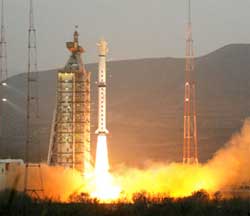Environmental satellite fails to enter orbit

The satellite, meant to be a key tool in Brazil's efforts to control Amazon rainforest deforestation and monitor its huge agribusiness sector, blasted off from Taiyuan Satellite Launch Centre in Shanxi province on a Long March 4B rocket at 03:26 GMT, the official Xinhua news agency said.
"The rocket malfunctioned during the flight and the satellite failed to enter orbit," the state news agency quoted military sources as saying.
The satellite is known as CBERS-3 (China-Brazil Earth Resources Satellite 3), or Ziyuan I-03 in Chinese. Ziyuan is the Chinese word for "resource".
In Brazil, the National Institute for Space Research (INPE) said in a statement that there was a failure of the launcher during the flight and consequently the satellite was not positioned in the planned orbit.
Preliminary evaluations suggest that the CBERS-3 returned to Earth. The CBERS remote-sensing satellite programme grew out of a bilateral partnership agreement signed in 1988.
The satellite is based on the Chinese Ziyuan 1 design but includes Brazilian-designed mission payload.
Three satellites of the series were launched in 1999, 2003 and 2007 aboard Chinese-made Long March rockets.
CBERS-3 was originally scheduled to be launched in 2009, but the launch date was repeatedly postponed. A CBERS-4 is scheduled to be launched in 2015. China launched its first moon rover mission last week, the latest step in an ambitious space programme, which is seen as a symbol of its rising global stature.
The rover, known as Yutu, or Jade Rabbit, is due to land on the moon in mid-December.
China sees its space programme as a symbol of its growing international status and technological advancement, as well as of the Communist Party's success in reversing the fortunes of the once impoverished nation.
It aims to establish a permanent space station by 2020 and eventually send a human to the moon.
Source: AFP via I-Net Bridge
Source: I-Net Bridge

For more than two decades, I-Net Bridge has been one of South Africa’s preferred electronic providers of innovative solutions, data of the highest calibre, reliable platforms and excellent supporting systems. Our products include workstations, web applications and data feeds packaged with in-depth news and powerful analytical tools empowering clients to make meaningful decisions.
We pride ourselves on our wide variety of in-house skills, encompassing multiple platforms and applications. These skills enable us to not only function as a first class facility, but also design, implement and support all our client needs at a level that confirms I-Net Bridge a leader in its field.
Go to: http://www.inet.co.za











